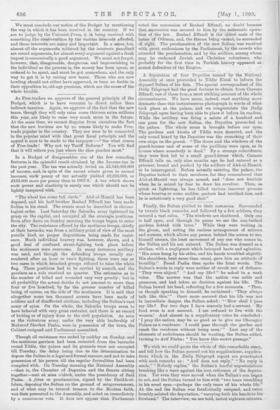A deputation of four Deputies named by the National, Assembly
at once proceeded to Yildiz Kiosk to inform the deposed Sultan of his fate. The special correspondent of the Daily Telegraph had the good fortune to obtain from Carasso Effendi, one of these four, a most striking account of the whole, circumstances. We have never, indeed, read anything more dramatic than this instantaneous photograph in words of what took place at the palace, and we congratulate the Daily Telegraph upon having been able to place it before its readers.. While the artillery was firing a salute of a hundred and. one guns for the new Sultan, the Deputies proceeded to the palace. The whole scene is brought before our eyes. The gardens and kiosks of Yildiz were deserted, and the only sound heard by the Deputies was the crunching of their own steps on the gravel. "The doors and the windows of the guard-houses and of some of the pavilions were open, as itL houses where somebody is dead." By a strange coincidence, they were first led to a small guard-house which, Carasso Effendi tells us, only nine months ago he had entered as a prisoner, bound and pushed by the soldiers of Abd-ul-Hamid, to be interrogated. Before actnally entering the palace, the Deputies looked to their revolvers, for they remembered that Abd-ul-Hamid was always armed, and "does not hesitate when he is seized by fear to draw his revolver. Thus, as quick as lightning, he has killed various innocent .persons whose bearing or some sudden gesture had terrified him, and- he is notoriously a very good shot."










































 Previous page
Previous page